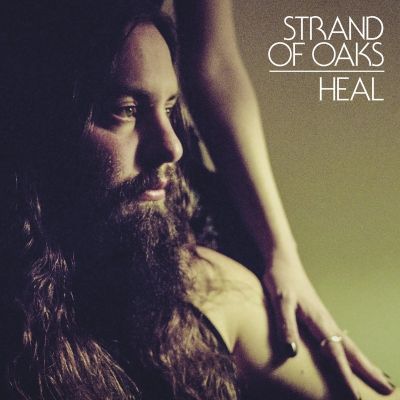When it was first released in 2014, Heal was one of hundreds of albums relegated to an insurmountable pile of music that was stored in the nebulous entity known only to me as “The Cloud.”
I can’t tell you how Heal broke out of that prison, but it made its way to me a little over a month ago.
Full disclosure: 2014 through most of 2016 were not good years for me. Consequently, music—an aural lifeline I had a death grip on for over 20 years—slipped in and out of my awareness, when I bothered trying to tune in at all.
Now, let me also say that, today, Heal is not a record that faithfully and fatefully reached through the chasm of the cosmos and delivered itself unto me at a time when I needed it most—a record that saved me. That’s not true. And, let’s be honest, those types of stories are typically, A.) boring, B.) typically embellished, and/or C.) shared by everyone. Albums and songs rarely save us in defining, proactive ways; it's unfair to think that they could, or even that we deserve that type of saving. They can heal us for certain, but our lives aren’t saved by them.
Heal, I believe, celebrates that unfair quality of life, and listening to Timothy Showalter grapple with this faceless unfairness makes it that much more appealing and easier to connect with.
Whatever life events crashed down on Showalter prior to Heal obviously fucked him up good. It’s not hard to guess from the lyrical content what they might be—drugs, hedonism, infidelity, mortality, the recognition of an encroaching death, purposelessness. Having no real context for Strand of Oaks or Showalter’s previous records aided my appreciation of Heal from the very start. The honesty is direct and uncalculated as are his descriptive turns of phrase. I’ve heard my share of confessional songwriting before, but I’ve never heard someone like Showalter expose just how uncool he truly is. He’s got no problems name-dropping other artists (Smashing Pumpkins, Sharon Van Etten) and he isn’t the least bit interested in keeping the names of his friends protected, nor is he interested in protecting himself from his own machinations. Heal is psychotherapy for a universal bruised psyche but its not the kind of wallowing, miserable proclamations that resonates with Dashboard Confessional fans. Rather, it’s a celebratory exposure. With awesome synths.
I’ve heard my share of confessional songwriting before, but I’ve never heard someone like Showalter expose just how uncool he truly is.
On Heal's title track, he sings, “I know you cheated on me/ but I cheated on myself” and it sounds like it should be a pair of easily dismissed lines. Showalter grappling with a specific infidelity but it sounds like a universal one. And whenever Showalter turns the mirror back on himself—and he does so many times throughout Heal—he seems to be less concerned with how others treat him than he is with how he has treated himself and by proxy, those around him. On the album's centerpiece, “JM,” it’s striking when he sings “I was mean to my dad / cause I was mean to myself.” That sort of awareness is not typical without a major life event forcing a reexamination and a reconciliation. Maybe Heal is both.
Showalter looks impressively like a hedonistic giant. Heal’s title track contains “Black boots black jeans black beard/ Walking down the street in the morning air,” a spot-on description of his typical wardrobe, and he doesn’t shy away from open drug use, based on some of the features about him. Interestingly enough, the more I read about Showalter, the less I like him as a person. Yet his songs and his voice have a magnetic quality that directly endear me to him. Despite his drugginess, he’s not a glorifier of drug use like Pink Floyd, Oasis, or even pre-sober Ryan Adams. He culls his experiences and wraps them inside his past, his pain, and his current identity—sometimes all at once on “Goshen ’97” the album opener that namechecks his birthplace (a northern Indiana town) and a youthful year of music and indiscretion (“singing Pumpkins in the mirror/ porn and menthols under my bed”).
“Goshen ’97” grabbed me by the collar. For someone like me who remembers the era of the '90s and the nostalgia that blinds us to its realities, it’s a sweet song that I easily imagine taking place in any American teenage town. And that’s how almost all of Heal operates; a pointed mixture of ennui and nostalgia for more memorable times. Not necessarily better times but times when every minute and musical discovery seemed to carry the entire weight of the future.
And so I’m torn. Because as I’m writing these words, Showalter is preparing to hit the stage a mere ten miles from my house to warm up the audience for Jason Isbell and the 400 Unit. I’m missing the show, a decision I’m sure I’ll regret. But I'm also trying to live outside of missed moments and spend some time indulging in a past time I hope Showalter might recognize: staying inside, maybe reflecting a bit (sans drugs—sorry, Showalter) while I’ve got his “sweet tunes to play.”


